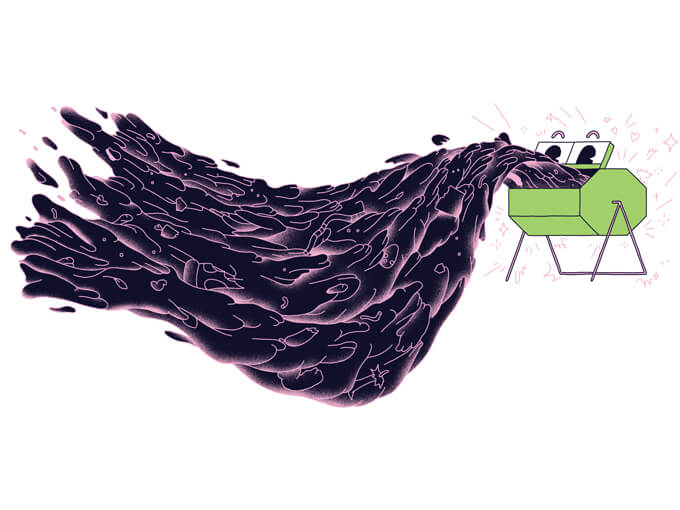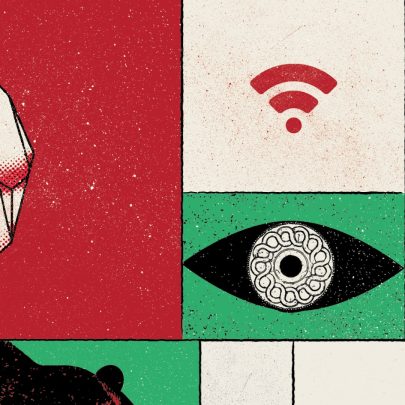Oct 3, 2019 Society
Metro’s editorial director examines his own mid-life environmental crisis, the battle between guilt and goodness and the importance of expensive Swedish composters.
Humans despise hypocrites. Family-values campaigners found to have wild sexual proclivities; politicians who complain about extravagant spending and then get done for dodgy expenses; priests who pray for the weak — and then prey on them; environmental crusaders who own airlines. I am one of those hypocrites (but none of those specific hypocrites). I have faith in the scientific method and in scientific consensus and believe it’s very clear that human activity is negatively impacting the health of the planet. But I am also a man with four daughters who finds it difficult to give up many of the comforts and conveniences of the modern world. As an old hippie friend from university semi-jokingly said to me recently when I saw him for the first time in about 15 years: “Way to overpopulate, planet killer.”
I love being part of a big family. Our children are magical creatures who bring a huge amount of joy and meaning to our lives. But they are very environmentally unfriendly. Due to our excessive procreation, we live in a larger-than-average house, have a larger-than-average car and consume more energy, water, food, plastic and pretty much every other resource you can think of than other, smaller families — and far more than families of a similar size in the developing world.
To assuage our crushing environmental guilt, we do what we can to limit our impact. I bike to work and the kids walk to school; a year or so ago, I stopped eating meat (but, baby steps, kept eating fish); we recycle; we grow some vegetables; we try to support more sustainable companies; we buy in bulk; I spend far too much time looking for secondhand items on Trade Me; and we tell the kids not to leave the tap running when they’re brushing their teeth. Oh, how pure and virtuous we are! Our fruit and vegetable scraps and coffee grounds went into one of those classic black plastic compost bins that look like a Dalek. We would fill it up, wait for ages, awkwardly extract the compost from those small square holes at the bottom, and dig it into the garden — avocado skins and eggshells stubbornly undecomposed. Then the rats arrived.
They were not rats the size of cats, like those seen recently in Titirangi, but they were still rats. Impressively, they gnawed through the hard plastic lid and found a lovely warm home that was full of food. I envied and admired them. They were a model of adaptability in times of change and they have thrived in our filthy urban environment. We could probably learn from them — although, like me, they probably breed too much. I told my wife that composting was still the right thing to do and that the rats would be so satiated with our delicious scraps that the native birds would flourish. This rational argument didn’t fly; the compost bin had to go. The emotional, visceral response to seeing the rats frolic in the garden — and then hearing them in the eaves — was far more powerful than the long-term threat of climate apocalypse. So I put our unwanted compost bin on the berm for someone to pick up. In a depressing sign of environmental malaise, it stayed there for a couple of weeks before it eventually disappeared.
My guilt grew by the day as our food scraps went straight into the rubbish. According to drawdown.org, which ranks the most effective solutions to climate change, one of the best things we can do is reduce food waste, both industrially and individually. That is ranked third, followed by eating a plant-rich diet. (I tend to skip past family planning in seventh.) My children rarely finish the food on their plates and it makes me unreasonably angry. “Some kids don’t have enough food and you’re just leaving it here on your plates?” I say, as they run off, not listening or caring. Until recently, I felt compelled to finish it — around 25% of my total dietary intake seemed to be made up of macaroni cheese, pizza, peas, carrots, peanut-butter sandwich crusts and mushy Weet-Bix and banana. That all changed when I decided to buy myself a 40th birthday present to deal with the food-waste/rodent conundrum.
I had long been looking forward to my mid-life crisis. I imagined it would involve growing a bald man’s ponytail and getting back into DJing (and the associated substance abuse). But this was more like a mid-life environmental crisis and it was much less exciting. After some online hunting, I found what I had been searching for: the Joraform ‘Little Pig’, a $595 rotating hot composter from Sweden that was made of metal and supposedly rodent-proof. It had two compartments, and was not just for the standard scraps. It could also handle pasta, meat, fish, dairy, onions, citrus, cereal and commercially compostable cups and plates. My environmental worthiness skyrocketed.
My wife was surprised that I had spent so much on a composter, and was convinced the rats would return. But I had faith in the Swedes and told her they were very honest people and would not lie about such a thing. I also felt she should be happy that I didn’t use the money for drugs and vinyl.
It was a thing of army-green industrial beauty. I placed it up against the fence, right beside the swing that never gets used. I mowed the lawns with my petrol-powered mower and put the all-important dry matter in. The environmental worthiness surged through me and my total dietary intake from leftovers almost instantly declined to about 5%. I followed the instructions and confidently put all kinds of food waste in there, including kids’ leftover spaghetti bolognese. But when I came back out the next day, the compost was alive and squirming.
Rats had been replaced by maggots. This was a shock but, apparently, if you can deal with the repulsive sight of them, it actually speeds the whole process up and should be considered a good thing.
I told my wife about our new friends and their important environmental role. She found it ironic, given my intense hatred of the flies that descend on Auckland (and me) in the warmer months. I said I would keep an eye on the numbers, but, thankfully, there was no noticeable increase. If the flies had ventured inside, I think I would have given up on saving the planet. It’s hard to be good, especially if it involves maggots. Or rats.
About a month later, the first chamber was full. It had done as promised and processed about 10-12 litres of organic matter per week. I was strangely excited. So I started filling up the one next door and let the first compartment lie. In another month or so, it had transformed into thick black gold — not an eggshell or avocado skin in sight — and I spread it proudly on the vege garden. It’s the circle of life, and it moved within me.
I often gloat about my Swedish composter, perhaps more than any other item I own. But I have convinced only one friend to join my exclusive, expensive, virtue-signalling composting club. I often return home from work to find the large Sistema plastic box that lives under the sink out on the bench, waiting for me to empty it into the Little Pig. The maggots have departed, and there have been no rat sightings, but, even so, I know this will always be my responsibility. I put the rubber gloves on, tip the scraps in, maybe add some cardboard if it’s a bit moist, smoosh it all down, grab the handles and give the surprisingly heavy beast a spin, waiting for the satisfying thump as it tumbles around. It smells bad, it looks bad, and mysterious, dark liquid often spills out. I try to pretend the bin juice that lands on my arm, the pungent aroma that wafts out and the small insects that fly around my face don’t affect me. It’s a small sacrifice, I tell myself. It is the right thing to do.
But the puckering of my mouth and furrowing of my brow show my weakness, and I think about how many people would be too grossed out to keep doing this. This is the challenge of our time. We have become so accustomed to convenience, pleasure, leisure, consumption and constant economic growth that it’s very difficult to give those things up, even if we know that the easy options are bad and the options that require slightly more effort (and may be slightly grosser) are better.
When I’m done, my environmental worthiness peaks. I feel like I am doing my bit. Then I go back inside my large, well-lit, warm house. It is full of food, modern appliances and resource-hungry humans. Then we book flights to Queenstown to see our families over Christmas. We will drive to the airport in our petrol-powered seven-seater.
And, to show our love for each other, we will buy things and wrap them in paper that gets thrown away immediately. We will consume far too much food and drink. We will laugh, we will probably fight and we will nap, like so many other families. But I will make sure the leftovers get eaten. I will make sure the scraps go in the compost bin. And I will continue to teeter on my hypocritical equilibrium between guilt and goodness.
This piece originally appeared in the September-October 2019 issue of Metro magazine, with the headline “Waste not”.






